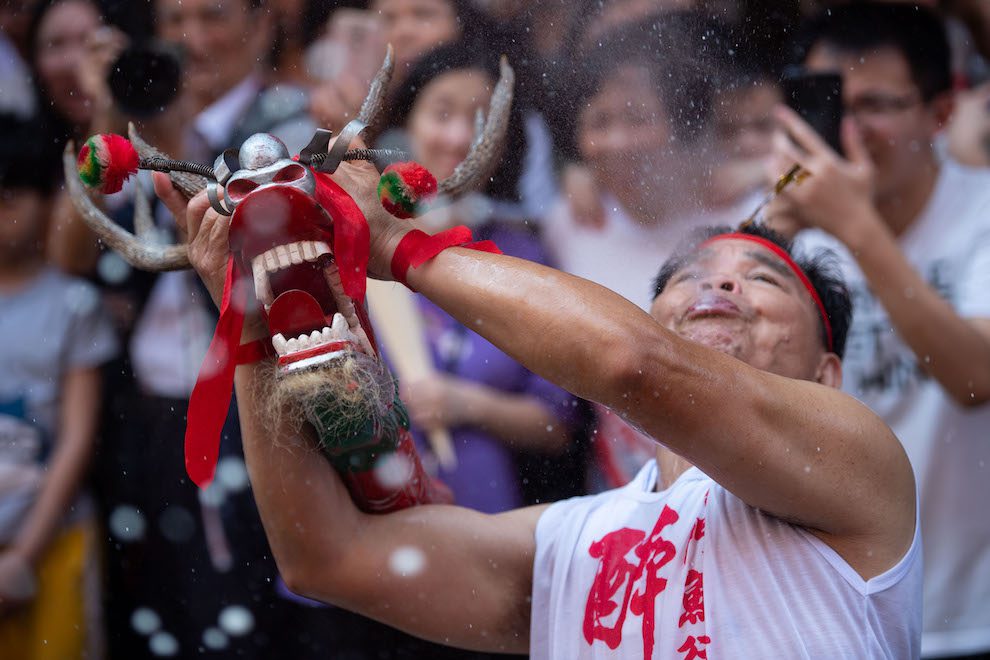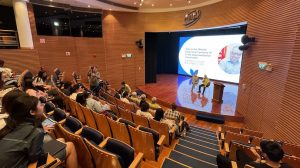Any attempts at transformational development of Macao’s Drunken Dragon Festival to utilise it as a tourism resource, would require differentiated strategies in order to engage in that process the various groups that participate in the festival. That conclusion is from a study involving a trio of scholars with links to IFTM.
The piece of research investigated the profile of the Macao residents that take part in the Drunken Dragon Festival and their perceptions of, and attitudes towards, the festival. Based on the results, the researchers clustered participants in 2 groups, concluding that the Macao SAR Government and the organisers of the festival should use “differentiated approaches” in engaging with the people in each of the clusters, to ensure effective communication with them.
The study was produced by former IFTM scholar Dr. Choi Suh-hee and 2 faculty members of the Institute: Dr. Ubaldino Sequeira Couto and Dr. Sharif Shams Imon. Their paper, titled “Resident attendees of Macao’s Drunken Dragon Festival: a cluster analysis”, was published last year in the International Journal of Event and Festival Management.
The study was funded by IFTM. According to the researchers, the work was one of “the first attempts to investigate the residents’ attitudes towards the transformational development of a traditional cultural festival as an effort to ensure the viability of intangible cultural heritage and to utilise it as a tourism resource.”
The study results were based on a survey answered by 378 residents attending the Drunken Dragon Festival. The answers collected were analysed by the researchers and then respondents were grouped in 2 clusters.
Although findings from the study showed that the attendees overall strongly valued the festival’s cultural importance, people in one of the clusters had a stronger perception of the cultural significance of the event. Respondents in this cluster were more likely to be involved with the festival and to be older than those in the other grouping.
The second cluster featured people with a narrower perception of the cultural value of the Drunken Dragon Festival. This grouping had a higher proportion of young people, including a greater number of students than the other cluster.
Tourism diversification
The Drunken Dragon Festival is a local traditional cultural event celebrated by fishmongers in Macao. It traditionally takes place on the 8th day of the 4th month of the Chinese lunar calendar. The festival features a variety of activities, including a parade. In recent years, the event has been promoted by the Macao Government Tourism Office (MGTO) as one of the city’s main cultural tourism festivals.
“During the process of developing cultural heritage tourism in its local cultural festivals, Macao has witnessed commercialisation and transformation of its festivals,” Drs. Choi, Couto and Imon said in their study. “The Drunken Dragon Festival also has experienced similar transformations, with the interest of MGTO in promoting this festival to tourists.”
The study findings pointed out that the cluster with people attributing a stronger cultural significance to the festival “tended to support its transformation.” For instance, members of this group were more open-minded about “sacrificing some objective authenticity by allowing some components of the festival to be held in non-traditional venues”, the researchers said, based on their findings.
This meant that “those who are old and deeply involved in the festival might surprisingly be flexible about adjusting the elements of the traditional cultural festival and would accept necessary transformation to ensure the viability of the heritage”.
Based on these findings, education and promotion efforts about the significance of the traditional cultural festival, and work to persuade people of the value of transforming and developing it to cater more to tourists, should be targeted particularly at people in the cluster attributing a lower cultural significance to the Drunken Dragon Festival, the researchers argued.
In addition, the findings of the study showed that people in both clusters were “quite positive” about increasing participants from a diversity of cultures and getting external support. Nevertheless, members of both clusters were strict about holding the festival on its original date, the researchers said.
The scholars suggested that, considering that the cultural spaces linked to the Drunken Dragon Festival could not accommodate a large number of participants, “it might be inevitable to hold some, if not all,” segments of the event in other venues, to raise awareness of the festival to more locals and tourists. “In doing so, the Government can recognise the resident attendees’ general support for using this heritage for further tourism development, especially by diversifying tourism offerings in this region where the main sources of tourism revenues are related to casinos,” the researchers said.
“In addition, some aspects of the heritage festival, such as the rituals, dining and dancing, can be carefully enacted during non-festival periods,” they added.
More info
Dr. Ubaldino Sequeira Couto teaches courses related to the management of festivals and events at IFTM. Dr. Couto holds a PhD from Leeds Beckett University. His research interests include festivals and events, Macanese identity, and experiential learning in education related to events, tourism and hospitality.
Dr Sharif Shams Imon is an Invited Assistant Professor at IFTM. He is the Coordinator for the Cultural and Heritage Management Programme. He holds a PhD in Urban Conservation from the University of Hong Kong. Dr Imon specialises in cultural heritage and tourism management, especially in historic settlements.
https://doi.org/10.1108/IJEFM-12-2019-0062









